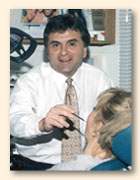What is TMJ (Temporomandibular Joint Syndrom)?
It is estimated that 10 million Americans suffer from TMJ syndrome, a condition in which the temporomandibular joint does not function properly. This is the joint that connects the temporal bone (the bone that forms the sides of the scull) with the mandible (the jaw bone). We use this joint more frequently than most of the other joints in our bodies. Every time we talk, chew, bite down, or swallow we put the TMJ to work. This condition produces pain in the muscles and joints of the jaw that can radiate to the face, neck, and head and even the shoulders. There also may be difficulty opening the mouth all the way, or clicking and popping noises when chewing, yawning, kissing or moving the joint.
TMJ can be caused by trauma, disease, wear due to aging, or habits
- Trauma: Trauma is divided to microtrauma and macrotrauma
- Microtrauma is internal, such as bruxism (grinding the teeth) and clenching (jaw tightening). This continual hammering on the temporomandibular joint can change the alignment of the teeth. Muscle involvement causes inflammation of the membranes surrounding the joint. Teeth grinding (bruxism) and clenching are habits that may be diagnosed in people who complain of pain in the temporomandibular joint or have facial pain that includes the muscles involved in chewing (myofascial pain).
- Macrotrauma, such as a punch to the jaw or impact in an accident, can break the jawbone or damage the disc.
- Bruxism: Teeth grinding as a habit can result in muscle spasm and inflammatory reactions, thus causing the initial pain.
- Changes in the normal stimuli or height of the teeth, misalignment of the teeth, and changes in the chewing muscles may cause temporomandibular joint changes. Generally, someone who has a habit of grinding his or her teeth will do so mostly during sleep.
- In some cases, the grinding may be so loud that it disturbs others.
- Clenching: Someone who clenches continually bites on things while awake. This might be chewing gum, a pen or pencil, or fingernails. The constant pounding on the joint causes the pain. Stress is often blamed for tension in the jaw, leading to a clenched jaw.
- Osteoarthritis: Like other joints in the body, the jaw joint is prone to have arthritic changes. These changes are sometimes caused by breakdown of the joint (degeneration) or normal aging. Degenerative joint disease causes a slow progressive loss of cartilage and formation of new bone at the surface of the joint. Cartilage destruction is a result of several mechanical and biological factors rather than a single entity. Its prevalence increases with repetitive microtrauma or macrotrauma, as well as with normal aging. Immunologic and inflammatory diseases contribute to the progress of the disease.
- Rheumatoid Arthritis: Rheumatoid arthritis causes inflammation. As it progresses, the disease can cause destruction of cartilage and erode bone, deforming joints. It is an autoimmune disease involving the antibody factor against immunoglobulin G (IgG). Chronic rheumatoid arthritis is a multisystem inflammatory disorder with a persistent symmetric joint involvement. Certain infectious diseases may be the cause of rheumatoid arthritis.
Help For TMJ Syndrome
Luckily, there are a few things you can do to alleviate the pain and possibly take care of it altogether without seeing a doctor. The American Academy of Otolaryngology-Head and Neck Surgery recommends trying some simple remedies. To reduce the amount of wear and injury to the joint, chew evenly (left vs. right); stop chewing gum; avoid hard chewy foods, and stop clenching, or grinding your teeth. To aid the healing processes, apply a heating pad (or some form of heat) for 20 minutes at least twice a day. Two aspirin or ibuprofen tablets can help reduce inflammation. Don't use them everyday; if the pain is that bad, see your dentist. If pain persists after a few weeks, or if it is already unbearable, your should see your dentist who can check the alignment of your teeth. Most cases of TMJ dysfunction can be taken care of by either readjusting a patient's bite or by fitting him or her with a mouth-piece. A special mouth-piece is made to be worn at night to prevent clenching and compression of the joint. This also may help correct the bite. Your dentist should be qualified to do both of these procedures.Orthodontists, physical therapists, and dentists all offer treatments for TMJ. However, it is estimated that 90% of all TMJ cases respond to simple, inexpensive treatments, like giving up chewing gum for a few weeks or more to see if that helps, avoid sleeping on the side of your face where your jaw is more sore. More severe cases of TMJ dysfunction are referred to an oral surgeon who can coordinate a treatment plan that may or may not include surgery. Reconstructive surgery of the jaw is rarely required. In fact, studies have shown that the results are often worse than before surgery.
Be cautious about any non-reversible treatment method that permanently alters your bite. However, if a mouth guard doesn't work, your dentist may recommend orthodontics to help re-align your teeth.
Muscle relaxant medications may help. Nonsteroidal anti-inflammatory medications (NSAIDS) help reduce inflammation in the jaw stemming from arthritis or other causes of inflammation.
Outlook (Prognosis)
Most cases can be successfully treated, although initially it may be difficult to diagnose the problem and find an effective solution. Some cases of pain go away on their own without treatment. TMJ-related pain tends to be cyclical and may return again in the future. If the cause is nighttime clenching, treatment can be particularly tricky because it is a sleeping behavior that is hard to control.
Mouth splints are a common treatment approach for teeth grinding. While some splints may silence the grinding by providing a flat, even surface, their effectiveness at reducing pain or stopping clenching is more controversial. Splints may be effective in the short-term but could become less effective over time. Splints can also cause changes in your bite.
Possible Complications
- Chronic headaches
- Chronic facial pain
When to Contact a Medical Professional
See your health care provider immediately if you are having trouble eating or opening your mouth. Keep in mind that a wide variety of possible conditions can cause TMJ symptoms, from arthritis to whiplash injuries. Experts who are specially trained in facial pain can help diagnose and treat TMJ.
TMJ problems do not fall clearly into one medical discipline. There are a wide variety of treatment approaches. If you are interested in a massage-based approach, look for a massage or physical therapist trained in trigger point therapy, neuromuscular therapy (NMT), clinical massage, or pain relief, particularly as it applies to TMJ pain.
Dentists who specialize in evaluating and treating TMJ disorders will typically perform x-ray exams and may use a kinesiograph or EMG (electromyography). They may give the patient a mouth guard. Surgery is now considered a last resort by most TMJ experts.
Office Hours:
Monday - Friday: 8:00am - 6:00pm
Saturday: 8:00am - 2:00pm
Tuesday & Thursday: Evening Appointments
*Any emergency request will be given priority.

 Dr. Arthur Kezian
Dr. Arthur Kezian